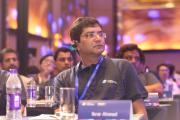
Ibrar Ahmed
Percona LLC
12:05
01 March
45 min
All about PostgreSQL Security
PostgreSQL provides different levels of security. This talk will cover all the available security techniques used in PostgreSQL 13. We’ll look at client-side security (LibPq, JDBC) through to server-side security. It will cover all supported authentication methods and the pros and cons of all these methods. Some of the key features of the talk are:
- Introduction to Cryptography
- SSL, TLS, GSSAPI, and OpenSSL
- Client-Side Encryption
- Securing Authentication
- Securing Data on the disk
- Securing Backup & Basebackup
- Securing Replication
- Database Roles and Privileges
It’s important to be familiar with all the security levels such as (1)network-level security (2) on-disk security (3) row-level, (4), and column level security. The talk will cover all the aspects with some real-life use cases and examples.